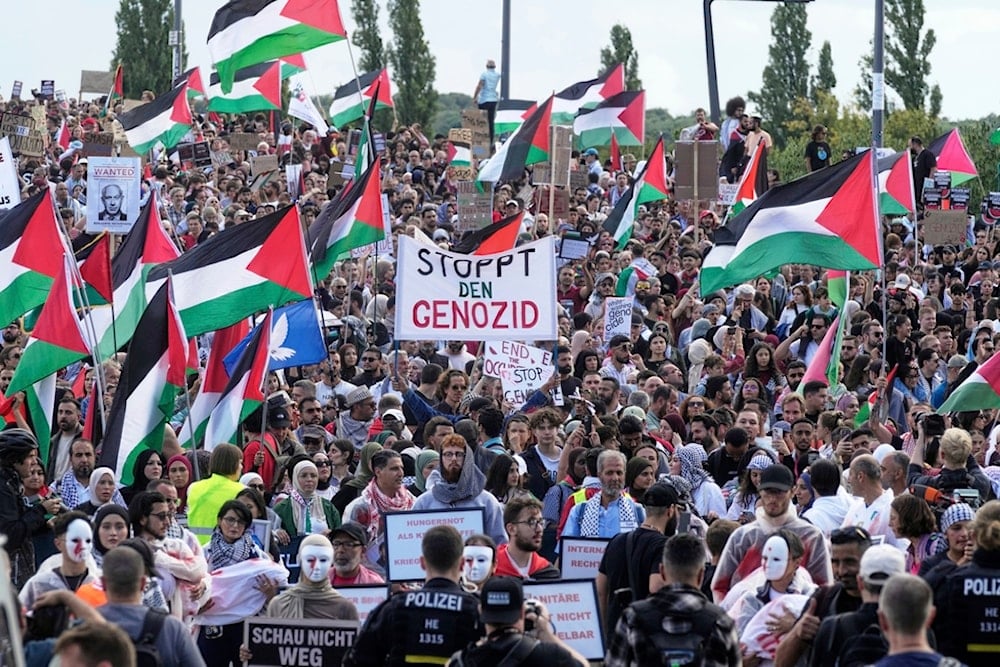West weaponizing laws to silence pro-Palestine activism: FIDH
A new FIDH report accuses Western governments, particularly the UK, US, France, and Germany, of using counter-terrorism and antisemitism laws to criminalize pro-Palestine activism.
-

Thousands of people take part in a pro-Palestine demonstration in Frankfurt, Germany, Saturday, Aug.30, 2025 (AP)
The right to protest is facing increasing restrictions across the West, The Guardian reported on Monday, citing a new study by the International Federation for Human Rights (FIDH), which accuses governments of criminalizing pro-Palestine activism and using counter-terrorism and antisemitism laws to stifle dissent.
The report focuses on the UK, US, France, and Germany, accusing authorities in these countries of "weaponizing" national security and anti-hate legislation to silence criticism of "Israel" and suppress demonstrations supporting Palestinian rights in Gaza and the occupied West Bank.
"This trend reflects a worrying shift towards the normalization of exceptional measures in dealing with dissenting voices," Yosra Frawes, head of FIDH's Maghreb and Middle East desk, told The Guardian.
Compiled from open-source data, witness accounts, and institutional reports gathered between October 2023 and September 2025, the study was released just one day after a US-brokered Gaza ceasefire that secured the release of all living Israeli captives and around 2,000 Palestinian detainees.
According to FIDH, restrictions on speech and assembly have extended beyond protests, impacting journalists, academics, and public officials who express solidarity with Palestinians.
Protest erosion
In the United Kingdom, the organization found that protest rights have eroded under both Conservative and Labour administrations. The report points to the 2024 anti-protest law introduced by the Conservatives, later deemed unlawful, and to what it calls the Labour government's continuation of "official narratives" justifying support for "Israel".
It highlights former Home Secretary Suella Braverman's branding of pro-Palestine rallies as "hate marches", arguing that this rhetoric "stigmatized support for Palestine and Palestinian resistance movements" and "worked to discriminate against Muslims and other racialized groups in the UK."
FIDH says the change in government in July 2024 "did little to change official government narratives," claiming Labour has linked criticism of "Israel" with "violent antisemitism" while continuing to target Muslim and racialized communities.
Rising tensions
The tensions have been further inflamed by the Labour government's ban on the activist network Palestine Action and its proposal to expand police powers at protests.
FIDH draws parallels across the Atlantic, where US authorities have detained demonstrators and pursued legal actions against individuals expressing solidarity with Palestine. In France, the government has faced criticism for banning pro-Palestine demonstrations in several cities and for dissolving the rights group Urgence Palestine.
Meanwhile, in Germany, protests have drawn thousands, but police tactics and restrictions on slogans deemed antisemitic, for the mere criticism of "Israel", have been widely condemned as excessive. The report argues that Germany's actions reflect a "collective discomfort" in balancing free expression with its postwar responsibility to combat what it classifies as "antisemitism".
Freedom crisis
The federation recommends that the UK establish an independent oversight body for policing demonstrations and amend key legislation, Section 12 of the Terrorism Act 2000 and Section 11 of the Public Order Act 2023, to protect political speech and prevent arbitrary searches.
"Ultimately, the crackdown on solidarity with Palestinians reveals a profound crisis, not only of human rights in the occupied territories but of freedom itself, in societies that claim to be democratic," the report concludes.
FIDH says that while legal frameworks vary among the UK, US, France, and Germany, the trend toward restricting Palestinian solidarity movements represents a global pattern of shrinking civic space, one that calls into question the credibility of Western nations as defenders of democratic freedoms.
Read more: Pro-Palestine rallies take over Europe despite Gaza ceasefire

 4 Min Read
4 Min Read









